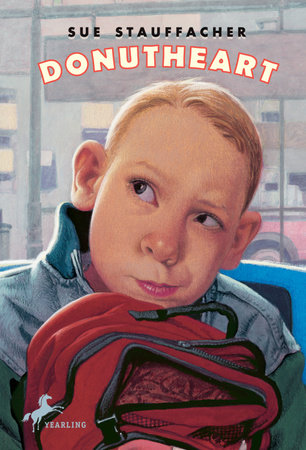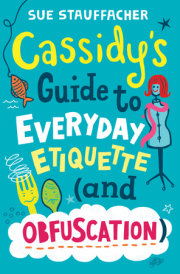CHAPTER ONE
Fear of Flying
In the course of human events, it is sometimes necessary to reduce one's water intake to delay natural functioning. Using the boys' bathroom at Pelican View Middle School was to be avoided whenever possible. I will spare you the details of my first visit; it's enough to know that it involved me, Franklin Delano Donuthead, an industrial-sized roll of toilet paper, and an eighth grader's knowledge of ancient Egyptian mummification techniques.
The problem is, the adolescent body is 75 percent water. And what goes in must come out. Just not in the boys' bathroom. Note that I did not say "the boys' and girls' bathrooms." All you need is a peek through the open door to realize that girls can attend to their business behind closed doors. I am still working through my feelings about this. Who decided--and then proceeded to tell generations of architects--that boys need less privacy than girls? Who? Girls are always saying they want everything to be equal. Hello? The restroom facilities are not equal.
Principles such as equality are as important to me as they were to my namesake, Franklin Delano Roosevelt. "Rules," our late, great thirty-second president liked to say, "are not necessarily sacred. Principles are." So I maintain a strict code of conduct based on my interpretation of the principles set forth by President Roosevelt in the New Deal. These include:
Mental Improvement
Health Promotion
Risk Avoidance
The sad state of boys' bathroom facilities had not yet hit the national scene when FDR was in office. Understandably, he had to figure out the Depression and World War II first. Historians could also argue that FDR was more concerned with job security than risk avoidance. But I am living proof that times have changed, and the order of the principles needs to be shuffled around a bit for the new century.
So every time I stand outside the boys' bathroom, health promotion and risk avoidance start duking it out in my mind.
Health promotion: Pee! You've got to!
Risk avoidance: Are you kidding? Protect your vitals!
Health promotion: Use the staff bathroom by the office.
Risk avoidance: What if Coach Dilemming's in there!?
By the sixth week of sixth grade, my tendency to avoid risk was winning on a daily basis, and my lack of fluids was affecting my overall level of health so dramatically that I was forced to do what I try very hard not to.
And that is to interrupt the early-morning reverie of the chief statistician for the National Safety Department in Washington, D.C. Her name is Gloria Nelots, and I happen to know that at six-thirty a.m. she is at her desk at department headquarters, drinking a cup of very strong coffee with powdered cream and artificial sweetener and synchronizing her hand-held to her computer's notebooking system.
Gloria: This better not be you, Franklin.
Me: Is that how you answer an agency line, Gloria? What if I were your boss?
Gloria: I have it on good authority that he is on the treadmill in the company gym at the moment. (Long silence. Gloria is a bit grumpy in the morning.)
Me: Gloria, have you ever heard of a condition called "paruresis"?
Gloria: I can't say I have, Franklin.
Me: Really? I'm shocked.
Gloria: Well, are you going to enlighten me, or will I be forced to return to enjoying the early-morning quiet, which is the very reason I come to work before the rest of the department?
Me: Happy to. Basically, it's a fear of urinating in public.
Gloria: Last I heard, that was illegal.
Me: I'm not talking about the alleys next to bars, Gloria. I'm talking about designated public places. I'm talking about bathrooms . . . public bathrooms . . . as in the presence of other . . . well, boys . . . eighth graders to be precise. Members of football teams.
Gloria: You're having trouble letting it fly at school? Is that what you called me at 6:37 a.m. eastern standard time to discuss?
Me: Yes!
Gloria: My advice is, turn on the faucet before you unzip. Works wonders.
Me: But--
Gloria: The call buttons are lighting up here, Franklin.
Me: I don't hear any ringing.
Gloria: Nevertheless. Busy, busy. Oh, I almost forgot. How is Sarah? Has she picked out a costume yet?
Me: I'm afraid we're having a little trouble in that department as well.
Gloria: Really? You'll have to fill me in on that later. I'm still good for the bill. Have Julia send me the receipt straightaway.
Me: The trouble is . . .
Gloria: Good-bye, Franklin.
Why Gloria and my mother are so wrapped up in Sarah Kervick's life is a complicated matter that I haven't yet been able to completely puzzle through. Sarah arrived in Pelican View eleven months ago, during our fifth and final year of elementary school. At that time, my mother helped her out with certain . . . difficulties. Sarah does not at present have a mother, so she relies on mine to consult with about hair, clothes, and her overriding passion--figure skating. Gloria has also taken an interest and helps pay for Sarah's training and other expenses. I cannot for the life of me figure out why these two women should exercise what little maternal instinct they have on Sarah Kervick when clearly I, too, am in need of a mother's loving care.
Especially now that I am in middle school.
Copyright © 2006 by Sue Stauffacher. All rights reserved. No part of this excerpt may be reproduced or reprinted without permission in writing from the publisher.












